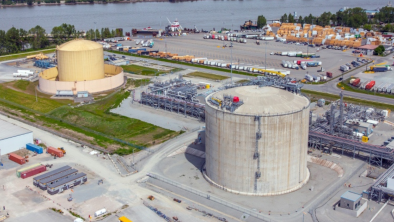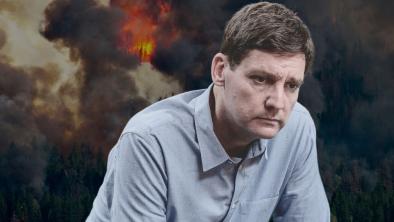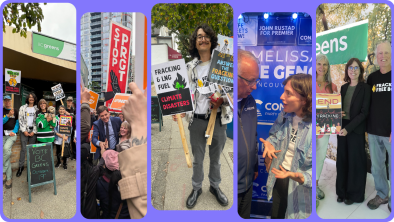True Climate Leadership Means Stepping Away From LNG

By Eoin Madden
Huffington Post
November, 11 2015
I remember standing beside a festering pool of "processed" water from a fracking drill site outside Hudson's Hope in northeast British Columbia. It was toxic water that was used by the gas industry to smash shale rock at high pressure and extract the fuel. My eyes hurt and my lungs burned from the oppressive air surrounding the pool (watch the video here). This isn't the natural gas from your grandparents' era -- we are in a new and extreme energy age.
The old, conventional gas reserves that did not require the use of hydraulic fracturing (fracking) are almost entirely gone. Now, 90 per cent of all new wells drilled in B.C. that would supply the province's proposed liquefied natural gas (LNG) industry will be fracked. Fracking demands massive amounts of freshwater, industrializes large areas of northeast B.C. and has major impacts on the climate.
From drill sites to massive export plants on our West Coast, the LNG industry as proposed will impact the climate in two ways: methane gas will escape at the extraction stage, and carbon dioxide will result from the burning of gas for power at the processing stage when it is liquefied and exported. Both of these gases are dangerous climate pollutants, with methane being the more powerful one over the short term.
Those climate impacts don't even include the emissions that would result from the gas being burned at its final destination. So, how is the B.C. government getting away with touting this industry as a "clean" energy resource?
In recent months, a team of B.C. climate experts has been deliberating over the next edition of the province's Climate Action Plan. This should be our plan to avoid the worst of climate change, and it replaces the one agreed in 2008 by the B.C. government. Back then, we committed to reducing our climate pollution to 33 per cent below 2007 levels by 2020 and 80 per cent by 2050.
The B.C. "Climate Leadership Team" asked for public input on the new climate plan in August. We'll know in less than a month if the government is willing to make the commitments and/or investments recommended during this consultation period -- that's when they'll be releasing a draft plan. That's also when they'll be heading to the international climate conference in Paris, where we will see new climate action commitments from around the world.
It's clear that creating a giant new fossil fuel industry is inconsistent with tackling climate pollution. It's like claiming to contribute to a global campaign to end smoking while constructing a network of new cigarette factories (even though they may be filtered cigarettes). I'm lucky to work with an organization that feels the same way, and we've made our views clear in our submission to the Climate Leadership Team.
This isn't the first time a climate team has been struck to take on the environmental challenge of our generation. In Washington state, our nearest southern neighbour, a team of 21 advisors (called the Carbon Emissions Reduction Taskforce, or "CERT") was tasked by the State's governor to come up with climate solutions late last year. Representatives of the state's businesses took a seat at the table, as they did in B.C.
In Washington, the business group consisted of utilities that deliver power to the local grid, a forestry operation, a solar and wind energy supplier and an airline. On B.C.'s team, it's a forestry operation, an airline, a former executive at B.C. Hydro and a representative of the LNG industry.
While Washington State invited input on climate policy from a renewable energy supplier, B.C. invited in the producers of climate-changing fossil fuels. What does that say about our priorities?
I don't believe that excluding any members of our society, including the fossil fuel industry, is the best way to reach agreement on how to deal with climate change. All manner of perspectives will help the team perform better, so long as the team's objective is never forgotten: the reduction of B.C.'s impact on the climate. We must not lose sight of that.
I hope that when push comes to shove, B.C.'s team has the vision and courage necessary to do what it takes to safeguard our children's future. It's not easy to admit, but if the B.C. government is truly committed to tackling climate change, we need to walk away from plans to create an LNG industry in B.C.
Now can B.C.'s Climate Leadership Team just go ahead and say that?
Photo Credit: Jeremy Williams via WC Files


